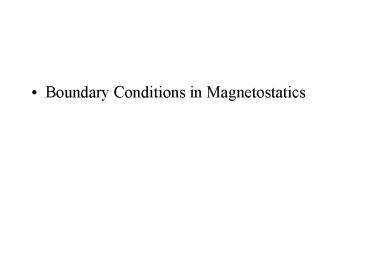Boundary Conditions in Magnetostatics - PowerPoint PPT Presentation
1 / 44
Title:
Boundary Conditions in Magnetostatics
Description:
We will consider separately component of B parallel to surface but perpendicular ... Above it is paramagnetic. phase transition. The Earth as a magnet! ... – PowerPoint PPT presentation
Number of Views:411
Avg rating:3.0/5.0
Title: Boundary Conditions in Magnetostatics
1
- Boundary Conditions in Magnetostatics
2
(No Transcript)
3
(No Transcript)
4
General Case
5
Now our surface is 2 dimensional so we need 2
directions to describe it, just as above we had a
sheet in the x,y plane The i and j vectors are
tangential to the surface. We will consider
separately component of B parallel to surface but
perpendicular to current and component of B
parallel to surface and parallel to current
6
(No Transcript)
7
(No Transcript)
8
(No Transcript)
9
(No Transcript)
10
Magnetic materials
11
(No Transcript)
12
(No Transcript)
13
(No Transcript)
14
- Rather than integrating over all the dipoles
- We can deal with these bound currents.
15
Ampères Law in Magnetized Materials
- We have found that the effect of magnetization is
to establish bound currents within the volume and
surface currents on the surface. Suppose we have
in addition free currents flowing in the
material,Jf
16
(No Transcript)
17
(No Transcript)
18
(No Transcript)
19
(No Transcript)
20
(No Transcript)
21
(No Transcript)
22
(No Transcript)
23
Microscopic Magnetism
- Semi-classical picture
- Electrons move in orbits around nucleus
- Spins on its axis
- Electrons fill up the shells of an atom
systematically, pairs of electrons tend to have
opposite spins
24
- The effect of spin is to give electron a
permanent dipole moment me - The effect of a magnetic field is to induce a
torque - Nme?B
- The indivdual dipoles will try to line up with
the field--paramagnetism
25
- However for atoms with an even number of
electrons the electrons come in pairs with
opposite dipole moments which tend to cancel
giving a zero torque
26
(No Transcript)
27
(No Transcript)
28
(No Transcript)
29
(No Transcript)
30
- Thus if we have a material that has all its
orbitals full, then the permanent dipole moments
tend to cancel out in pairs but - the effect of the electron motion adds up,
- so for such a material there is a tendency to
- oppose an applied magnetic field
- this is the origin of diamagnetism
31
Transition Elements
The 3d level, 10 orbitals fills us before the 4p,
one electron goes into each orbital before the
second in each
32
FeAr4s23d6
- Lots of half filled d orbitals,
- In the absence of a magnetic field all these
dipoles are randomly oriented but if you apply a
field they will line up with the field - Take the field away the dipoles tend to stay
aligned--- - Materials like iron are said to be ferromagnetic!
33
- If you take a piece of of raw unmagnetized iron
and examine it microscopically you find there
are small areas of the material - known as domains. Each domain contains a vast
number of atoms whose dipoles are aligned.Each
domain has an overall dipole moment. If you place
the iron in a strong magnetic field,
34
- Eventually all the domains will be aligned
- The iron is thensaturated
- Take the field away and you have a permanent
magnet
35
Magnetic domains in Co
36
Hysterisis
37
Hysterisis
38
(No Transcript)
39
Hysterisis Loop
40
- Random thermal motions compete with the ordering
of the domains. In fact at a material specific
temperature materials change their character. - This temperature is known as the Curie
temperature. - For iron it is 7700C
41
- Below this temperature
- The material is ferromagnetic
- Above it is paramagnetic
- phase transition.
42
The Earth as a magnet!
43
Where does the field come from
- Could it be a giant ferromagnet?
No the earths coreisvery hot There is iron there
but temperature far exceeds the Curie temperature
44
- earths-inner-structure
volcanoes
earths-magnetic-field-video.htm

